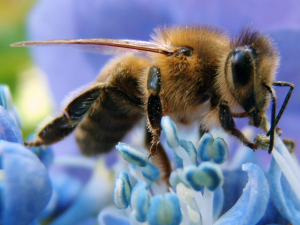Hay Fever Sufferers: Prepare for a High Pollen Count Summer

honey bee collecting pollen
Beverley Adams-Groom, of the National Pollen and Aerobiology Research Unit at Worcester University, said: “Most hay fever seasons are pretty bad these days because the grass and the trees tend to get the optimum conditions for growth and pollen production. We have certainly noticed that over the last 13 to 14 years there has been a steady increase in the severity of the seasons. We assume it is down to climate change. The hay fever season is also definitely longer. If we have a hot dry summer, the season will be over by early or mid-July, but these days it can go on until mid-August.”
Unfortunately anyone can develop hay fever at any stage of their life, regardless of a previous proclivity to the allergy. There are of course many over-the-counter hay fever remedies which some sufferers find helpful in easing their symptoms, but an increasing number of sufferers are turning to all natural and organic treatments. One such natural remedy is the herb butterbur which is thought to work in a similar way to allergy medications in blocking the action of histamine in allergic reactions.
Another natural strategy for easing the symptoms of hay fever is through dietary adaptation. Quercetin is an antioxidant that belongs to a class of water-soluble plant substances called flavonoids and is thought to prevent the release of histamine. Although you can buy Quercetin in supplement form, it is found naturally in foods such as apples (with the skin on), berries, red grapes, red onions and capers. Carotenoids (found in apricots, carrots, pumpkin and kale) help to decrease inflammation in the airways and Omega-3 fatty acids have been found to reduce the production of inflammatory chemicals, both of which could help ease hay fever symptoms
So hay fever sufferers take heart, there are ways to cope with your allergy this summer without having to turn to chemical products. Once you’ve bought your Quercetin supplements from your local natural food supplement shop and increased the carotenoids and Omega-3 fatty acids in your diet, make sure you consider how allergenic-resistant your home is. Extend a natural, chemical-free approach to your home and you could find all sorts of allergies are eased. You’ll also be able to have a restorative night’s sleep in a natural environment, helping you to enjoy the long hot summer days and nights rather than dread them. Find out more about how our chemical-free products can help allergy sufferers by taking a browse through our online store at www.naturalhome-products.com and read more about natural hay fever remedies at http://altmedicine.about.com/od/healthconditionsatod/a/allergies.htm